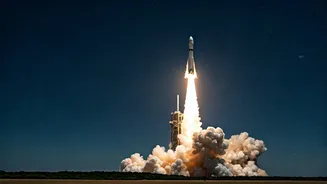Mission's New Schedule
The highly anticipated launch of the Falcon Heavy rocket, which was set to propel a private mission to the Moon, has been postponed. The revised launch date
is now scheduled for July 2026. This delay is significant because it shifts the entire mission timeline. This directly affects the deployment of Astrobotic Technology's lunar lander, Griffin, which is designed for NASA's Lunar CATALYST project. The intricacies of these adjustments will need to be carefully managed to ensure the mission's success. The implications reach beyond simply a change in date. The delay necessitates reassessment of logistical arrangements and strategic planning for the lunar lander's arrival on the Moon. These shifts underscore the dynamic nature of space missions and the complexities involved in coordinating international collaborations.
Impact on Landers
The delay directly impacts the timeline for Astrobotic Technology's Griffin lander, a critical component of the private lunar mission. This lander is integral to NASA’s Lunar CATALYST project, underscoring its importance to lunar exploration initiatives. With the Falcon Heavy launch moved to July 2026, the Griffin lander’s deployment schedule also experiences a parallel shift. Engineers and mission planners must now re-evaluate all aspects of the mission plan to accommodate the new launch date. The lander’s integration with the rocket and its subsequent operation on the lunar surface are areas where adjustments are likely. This delay is not merely a logistical challenge. It offers an opportunity for further refinements to the lander and associated technologies. It allows for additional testing, upgrades, and improvements to optimize the mission’s chances of success. The modifications will likely include adjustments to software, mission simulations, and contingency plans. These ensure the lander is fully prepared for its journey and its responsibilities upon reaching the lunar surface.
Mission's Complexities
The postponement of the Falcon Heavy launch demonstrates the inherent complexities of space missions. Such missions involve multifaceted technical, logistical, and collaborative elements. The rescheduling necessitates detailed coordination among multiple entities. SpaceX, Astrobotic Technology, and NASA (via the Lunar CATALYST project) all play pivotal roles, making the revised timeline a central focus. Various factors, including spacecraft readiness, payload integration, and launch site availability, contribute to the intricate planning. A launch delay can be influenced by several issues. These include software updates, payload integration, and environmental conditions. It demands flexibility and adaptability. The changes require revisiting schedules, resource allocation, and contingency measures. These mission adjustments, while complicated, highlight the relentless drive for advancement in space exploration. These missions provide invaluable data. They are fundamental in the ongoing pursuit of knowledge and the expansion of humanity's reach within the cosmos.














